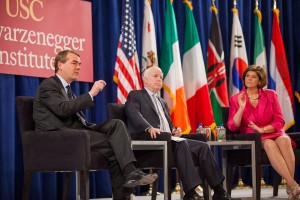Politicians, experts discuss immigration reform
As Sen. John McCain walked into the USC Schwarzenegger Institute’s bipartisan summit on immigration reform, he stopped before a demonstration of about 15 students from the School of Social Work.

Looking ahead · Sen. Michael Bennet (left to right), Sen. John McCain and ABC News Radio correspondent Ann Compton discuss immigration reform with USC students and faculty on Tuesday at the USC Schwarzenegger Institute’s bipartisan summit. – Ralf Cheung | Daily Trojan
“Let’s keep families together,” the group chanted in rally of support for comprehensive immigration reform.
McCain (R-Ariz.) waved his hand and made his way into Town and Gown, the site of the four-and-a-half hour symposium that featured political leaders and immigration experts, ranging from former President of Mexico Vicente Fox to former U.S. Commerce Secretary Carlos Gutierrez.
The forum fell just weeks after a bipartisan group of United States senators, known as the Gang of Eight, unveiled a bill to address the nation’s 11 million undocumented immigrants. The proposal provides a path toward citizenship if border tightens. The legislation is expected to be voted on in June, Sen. Michael Bennet (D-Colo.) said at the forum.
In his opening remarks, former California Gov. Arnold Schwarzenegger, and the institute’s namesake, said the Gang of Eight has “brought the chutzpah back” to Congress.
McCain said he has lobbied Republicans by emphasizing the importance of immigration reform as not just the right thing to do, but also as a political necessity, during a panel with Ann Compton, a White House correspondent for ABC News Radio, and Bennet.
“I also appeal to their base instincts and that is to review for them the percent of the Hispanic vote that we got in the last several elections, which is dramatically dropping,” McCain said. “If we don’t do this, you can’t begin the conversation with our Hispanic voters and all you have to do is the math.”
With the event, Gang of Eight members McCain and Bennet continued to make the case for their reform proposal on the road.
“The reason why we will be able to succeed here is because there has never been a coalition like has been assembled by this: business, labor, agriculture, unions, the Catholic Church, evangelicals,” McCain said.
Though some have attacked the pathway to citizenship as “amnesty,” Bennet said that this facet of the bill was not as contentious as the debate to iron out a deal on agriculture workers.
“Many people describe this as the most controversial part of the discussion,” Bennet said. “This was not the most controversial part of this discussion for the Group of Eight because there was general agreement, I think, that we live in a country where we don’t have a sub-class of people.
During the question and answer period, some students expressed concern about how a pathway to citizenship might negatively impact the economy.
Bennet addressed this issue by arguing that reform might, in fact, benefit the economic situation for American workers.
“Compared to today, the fact that we’ve had 11 million people that are in the shadows in this county is not good for American workers,” Bennet said. “It definitely depresses wages if you have people working for cash or under the table — outside of the law.”
The second panel, featuring Gutierrez as well as professors Dowell Myers and Pierette Hondagneu-Sotelo, discussed immigration reform, specifically as it relates to the economy.
Myers said new workers must fill the positions that open when people retire. He noted that the baby boomers account for 60 million of all workers, or 40 percent of the workforce right now.
“Over 20 years’ time, about 90 percent will be into retirement,” Myers said. “In the pipeline, we need reinforcement, and immigration is our secret weapon.”
The forum took an international perspective during the third panel, which featured a conversation between Fox, who served as Mexico’s president from 2000-06, and Univision 34 anchor Gabriela Teissier.
“Most of the discussion today has been inward — has been within the woods looking at the problems here — but a lot of things are going on around the world,” Fox said, noting rapid economic development in Asia and Latin America.
Fox reiterated his position that building a wall carries the wrong message with regard to the U.S. immigration system.
“Walls don’t work,” Fox said. “Walls, and again I say it with all respect, reflect fear.”
He also emphasized that, though immigration reform will benefit Mexico, the primary aspiration is to close the economic gap between Mexico and the United States. This has already begun, Fox said, citing the faster growth of Mexico’s economy and salaries.
“So sooner or later, that gap is going to unravel and I think that will be the best situation for North America,” he said.
Mikey Geragos, former Undergraduate Student Government president, said the forum provided a glimpse into the process behind drafting a comprehensive immigration bill.
“It was interesting to get a little more detail on the inner-working of the Gang of Eight, seeing what some of the sticking points were and how they overcame those,” Geragos said.
Los Angeles Mayor Antonio Villaraigosa and USC Trustee and former Congresswoman Jane Harman also delivered remarks at the symposium.
Villaraigosa reported that one out of 10 Angelenos is undocumented and said that although the bill is not perfect, it’s a step in the right direction.
“I learned a long time ago, don’t let the perfect get in the way of the good,” Villaraigosa said.
Though students viewed it as an informative event, the day was not without a good deal of political humor.
In his introductory remarks, Jack Knott, dean of the USC Sol Price School of Public Policy, joked that he has his own agenda for reform -— to include a clause that immigrants can run for president.
“Let’s please narrow it down so it doesn’t go crazy,” Schwarzenegger responded. “You have to be Austrian-born. You have to be a body builder. And you have to be an actor.”
